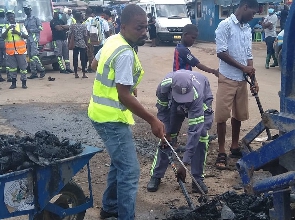The Coordinator of the Greater Accra Resilient and Integrated Development (GARID) project, Dr Kwadwo Ohene Sarfoh, has commended the seventeen beneficiary Metropolitan and Municipal Assemblies (MMAs) of the project for embarking on intensive clean-up and behavioural change campaigns.
The campaigns, he noted, will ultimately improve solid waste management and mitigate flood risks in Accra.
Dr Sarfoh gave commendations at separate locations when he visited and participated in some of the clean-up and behavioural change exercises organised by the beneficiary assemblies.
The campaigns followed an earlier disbursement of over Seven Million Ghana Cedis (Gh¢ 7, 156) to the 17 beneficiary MMAs under the project, for the operation and maintenance of drainage infrastructure in communities along the Odaw River Basin.
The beneficiary MMAs that are carrying out the exercises include the Accra Metropolitan Assembly; Ablekuma Central, North, and West Municipal Assemblies.
The others are Adentan Municipal Assembly; Ayawaso Central, East, North, and West Municipal Assemblies; Ga Central, East, North, and West Municipal Assemblies.
The rest are La Dade Kotopon Municipal Assembly; La-Nkwantanang Madina Municipal Assembly; Okaikoi North Municipal Assembly; and Korle-Klottey Municipal Assembly.
The clean-up and behavioural change outreach programme is part of community-based solid waste management interventions being implemented under the GARID Project by the Ministry of Sanitation and Water Resources to improve on solid waste management capacity in Accra and reduce the amount of solid waste flowing into the primary Odaw channel and the sea.
"Effective solid waste management and flood risk mitigation require not only physical interventions but also a change in behaviours and attitudes of the people” Dr Sarfoh observed.
The project coordinator explained that the “integrated approach being adopted by the assemblies to address the two challenges is highly commendable as it can help contribute to achieving our collective goal of making Accra a cleaner and more resilient city.”
He also entreated the officials of the MMAs to enforce sanitation regulations and building codes without fear and favour.
The Solid Waste Management Specialist for the GARID Project, Henrietta Osei-Tutu, emphasised the crucial role of proper waste management in reducing flood risks in the capital city.
She said, "the MMAs dedication to keeping their communities clean is an essential aspect of flood prevention. By reducing waste accumulation and ensuring the proper functioning of our drainage systems, we can minimise the incidence of flooding, and safeguard our lives, properties and the entire neighbourhoods."
The combined exercises witnessed active participation of community members, volunteers, and staff of the assemblies who engaged in waste collection, street cleaning, and desilting of community drains.
It also involved engaging community members through awareness programmes, and interactive sessions that promote responsible waste disposal practices, recycling, and flood prevention measures.
Some residents of Ofankor, a community in the Ga North Municipality said they were highly elated to be part of the exercise.
They acknowledged that it was their responsibility to keep their respective neighbourhoods clean and practice sustainable waste management.
“Henceforth, we, the residents of Ofankor will embark on a clean-up exercise every month to help reduce the perennial flooding in our community” they further assured.
Regional News of Wednesday, 7 June 2023
Source: www.ghanaweb.com













